新一代大学英语(1)第三单元 Characteristic of science
- 格式:docx
- 大小:25.55 KB
- 文档页数:2
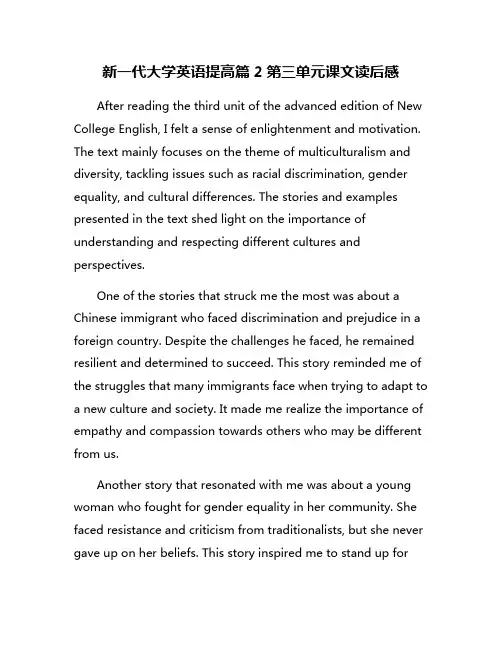
新一代大学英语提高篇2第三单元课文读后感After reading the third unit of the advanced edition of New College English, I felt a sense of enlightenment and motivation. The text mainly focuses on the theme of multiculturalism and diversity, tackling issues such as racial discrimination, gender equality, and cultural differences. The stories and examples presented in the text shed light on the importance of understanding and respecting different cultures and perspectives.One of the stories that struck me the most was about a Chinese immigrant who faced discrimination and prejudice in a foreign country. Despite the challenges he faced, he remained resilient and determined to succeed. This story reminded me of the struggles that many immigrants face when trying to adapt to a new culture and society. It made me realize the importance of empathy and compassion towards others who may be different from us.Another story that resonated with me was about a young woman who fought for gender equality in her community. She faced resistance and criticism from traditionalists, but she never gave up on her beliefs. This story inspired me to stand up forwhat I believe in and to never be afraid to challenge the status quo.Overall, reading the third unit of New College English has broadened my perspective and deepened my understanding of the importance of multiculturalism and diversity. It has motivated me to be more open-minded, tolerant, and accepting of others. I believe that embracing diversity is the key to building a more harmonious and inclusive society. I look forward to continuing my journey of learning and growing through the pages of this insightful textbook.。
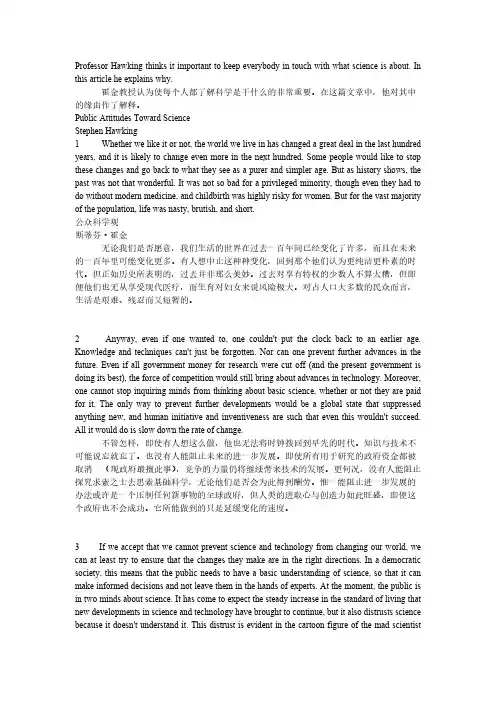
Professor Hawking thinks it important to keep everybody in touch with what science is about. In this article he explains why.霍金教授认为使每个人都了解科学是干什么的非常重要。
在这篇文章中,他对其中的缘由作了解释。
Public Attitudes Toward ScienceStephen Hawking1 Whether we like it or not, the world we live in has changed a great deal in the last hundred years, and it is likely to change even more in the next hundred. Some people would like to stop these changes and go back to what they see as a purer and simpler age. But as history shows, the past was not that wonderful. It was not so bad for a privileged minority, though even they had to do without modern medicine, and childbirth was highly risky for women. But for the vast majority of the population, life was nasty, brutish, and short.公众科学观斯蒂芬·霍金无论我们是否愿意,我们生活的世界在过去一百年间已经变化了许多,而且在未来的一百年里可能变化更多。

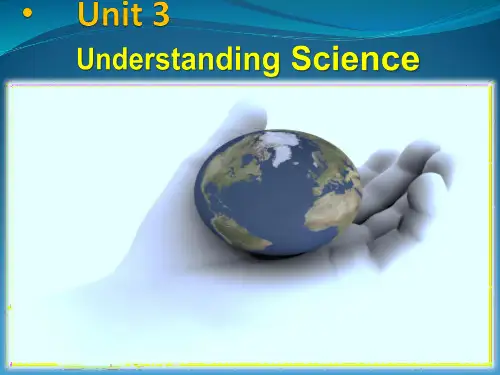
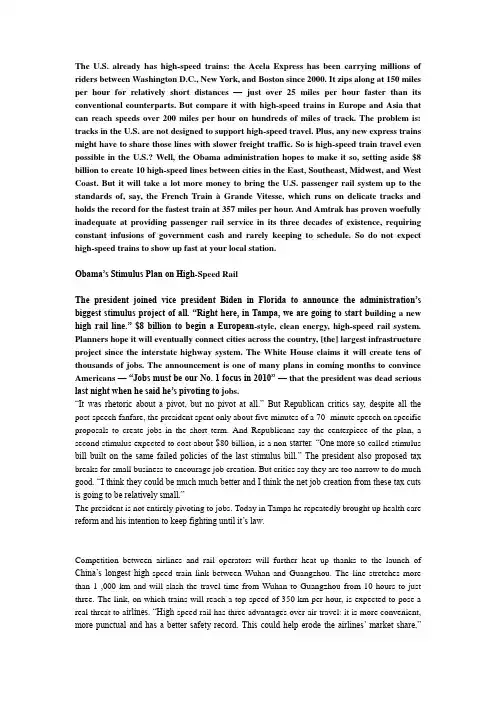
The U.S. already has high-speed trains: the Acela Express has been carrying millions of riders between Washington D.C., New Y ork, and Boston since 2000. It zips along at 150 miles per hour for relatively short distances —just over 25 miles per hour faster than its conventional counterparts. But compare it with high-speed trains in Europe and Asia that can reach speeds over 200 miles per hour on hundreds of miles of track. The problem is: tracks in the U.S. are not designed to support high-speed travel. Plus, any new express trains might have to share those lines with slower freight traffic. So is high-speed train travel even possible in the U.S.? W ell, the Obama administration hopes to make it so, setting aside $8 billion to create 10 high-speed lines between cities in the East, Southeast, Midwest, and West Coast. But it will take a lot more money to bring the U.S. passenger rail system up to the standards of, say, the French T rain àGrande Vitesse, which runs on delicate tracks and holds the record for the fastest train at 357 miles per hour. And Amtrak has proven woefully inadequate at providing passenger rail service in its three decades of existence, requiring constant infusions of government cash and rarely keeping to schedule. So do not expect high-speed trains to show up fast at your local station.Obama’s Stimulus Plan on High-Speed RailThe president joined vice president Biden in Florida to announce the administration’s biggest stimulus project of all. “Right here, in T ampa, we are going to start b uilding a new high rail line.” $8 billion to begin a European-style, clean energy, high-speed rail system. Planners hope it will eventually connect cities across the country, [the] largest infrastructure project since the interstate highway system. The White House claims it will create tens of thousands of jobs. The announcement is one of many plans in coming months to convince Americans —“Jobs must be our No. 1 focus in 2010” — that the president was dead serious last night when he said he’s pivoting to j obs.“It was rhetoric about a pivot, but no pivot at all.” But Republican critics say, despite all the post-speech fanfare, the president spent only about five minutes of a 70- minute speech on specific proposals to create jobs in the short term. And Republicans say the centerpiece of the plan, a second stimulus expected to cost about $80 billion, is a non-starter. “One more so-called stimulus bill built on the same failed policies of the last stimulus bill.” The president also proposed tax breaks for small business to encourage job creation. But critics say they are too narrow to do much good. “I think they could be much much better and I think the net job creation from these tax cuts is going to be relatively small.”The president is not entirely pivoting to jobs. Today in Tampa he repeatedly brought up health care reform and his intention to keep fighting until it’s law.Competition between airlines and rail operators will further heat up thanks to the launch of China’s longest high-speed train link between Wuhan and Guangzhou. The line stretches more than 1 ,000 km and will slash the travel time from Wuhan to Guangzhou from 10 hours to just three. The link, on which trains will reach a top speed of 350 km per hour, is expected to pose a real threat to a irlines. “High-speed rail has three advantages over air travel: it is more convenient, more punctual and has a better safety record. This could help erode the airlines’ market share,”said Si Xianmin, chairman of China Southern Airlines. To deal with this threat, China Southern Airlines has unveiled several counter measures, including cutting ticket prices from Wuhan to Guangzhou by almost half for purchases made in advance.“If railway chiefs cut the number of low-cost tickets on slower trains too sharply, as they did when the country’s first high-speed link opened between Beijing and Tianjin last year, the airlines could win more passengers with their cheap offers. But whichever side wins, passengers will be the ultimate winner.” said Zhao Jian, a profess or at Beijing Jiaotong University. Wu Wenhua, a researcher with the National Development and Reform Commission’s comprehensive transport institute, says that “developing high-speed rail networks is in line with the demand for high-efficiency, low-emissions transport.” By 2020 China plans to have high-speed rail services running between 70 percent of its key cities, covering more than 80 percent of the present airline network.High-Speed Rail Boost T ravelNow travel agents in Fujian are also getting in on the action. They’ve got big plans for the World Expo, even those taking place in Shanghai. The province has just begun a special high speed rail travel package to bring in Taiwan tourists, just across the Strait. Let’s take a look.High-speed rail service between Fuzhou and Shanghai takes only five hours. The Fujian branch of China Travel Service has exclusive rights to the High Speed Rail Tours for the World Expo. And it’s counting on its location to bring in tourists from Taiwan.[Wang Ying, vice General Manager of Inbound Tours, CTS:] “Once in Fujian, they can stay in the region for two to three days. And then they can take the high-speed rail to Shanghai for the World Expo.” Packages range from 900 yuan to 3,000 yuan each. The tour operator says it’s already signed cooperative deals with some travel firms in Taiwan. Island residents can apply with them. [Wang Ying:] “Travel agencies in Taiwan are already estimating that the event could help Fujian attract 800,000 to one million Taiwan touris ts this year.” Tour operators say World Expo theme travel services are extremely popular in Taiwan. Fujian tourism authorities are also planning more World Expo tour packages to attract overseas Chinese from south-east Asian countries like the Philippines and Malaysia.。
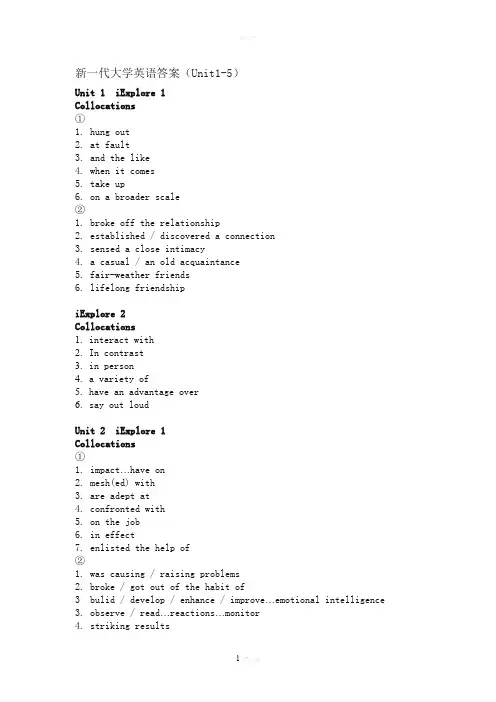
新一代大学英语答案(Unit1-5)Unit 1iExplore 1Collocations①1.hung out2.at fault3.and the like4.when it comes5.take up6.on a broader scale②1.broke off the relationship2.established / discovered a connection3.sensed a close intimacy4.a casual / an old acquaintance5.fair-weather friends6.lifelong friendshipiExplore 2Collocations1.interact with2.In contrast3.in person4. a variety of5.have an advantage over6.say out loudUnit 2 iExplore 1Collocations①1.impact…have on2.mesh(ed) with3.are adept at4.confronted with5.on the job6.in effect7.enlisted the help of②1.was causing / raising problems2.broke / got out of the habit of3 bulid / develop / enhance / improve…emotional intelligence3.observe / read…reactions…monitor4.striking results5.develop / heighten / improve empathyiExplore 2Collocations1.add to2.colorful3.elicit4.better5.plain6.clear7.single8.devastatingly9.underestimate10.enhancing11.magnet12.intense②1.arrived at its primary purpose→achieved/served/accomplished/fulfilled its primary purpose2.add a bit of sugar in their soap→add a bit of sugar to their soap3.relieve the strong emotions and negative thoughts→ release/shiftthe strong emotions and negative thoughts4.turn your world back→turn your world around5.akin with lighting a fire →akin to lighting a fire6.uncovered him →gave him away/betrayed him7.keep these painful experiences arm’s length afar →keep/ put thesepainful experiences at arm’s lengthUnit 3iExplore 1Collocations①1.In … terms2.get in the way of3.rather than4.check out5.came down to6.in vain7.in the first instance8.conform to9.transform … into10.put … down②1.present / report; findings2.conduct / do / perform experiments3.effective / novel methods4.distinctive / main / unique characteristics5.hazy / vague notion6.test the hypothesis7.bold hypothesis8.considerable / dramatic / gradual / significant changesiExplore 2Collocations1.had missed the point2.accounts … for3.turned out to be4. a layer of5.at the edge of6.interfere with7.not to mention8.migrate toUnit 4iExplore 1Collocations①1.in view of2.exclude…from3.felt compelled to4.share responsibility5.denied6.seek refuge7.by extension8.poured…into②1.exposed2.delivering3.private4.public5.gathered6.under7.systematic8.honorable9.ultimate10.with11.for12.toiExplore 2Collocations①1.out of print2.came off press3.subscribe to4.account for5.recede into6.appeal to7.to …belong8.get enough of②1.restage2.general3.sobering4.substantial5.mortally6.double7.aliveUnit 5iExplore 1Collocations①1.exercise of power2.soft power3.engage in4.gobble up5.soak up6.turn the tables7.by happenstance8.baby steps9.be perceived as10.dating back②1.dynamic/ major/ strong economy2.active diplomacy3.attract investment4.aggressive/ enormous/ gradual/ massive/ rapid expansion5.delay reformsiExplore 2Collocations1.rise to power2. a blessing in disguise3.adapting to4.trade…for5.taken… for granted6.in denial7.raise the bar on8.get on with欢迎您的下载,资料仅供参考!致力为企业和个人提供合同协议,策划案计划书,学习资料等等打造全网一站式需求9.。

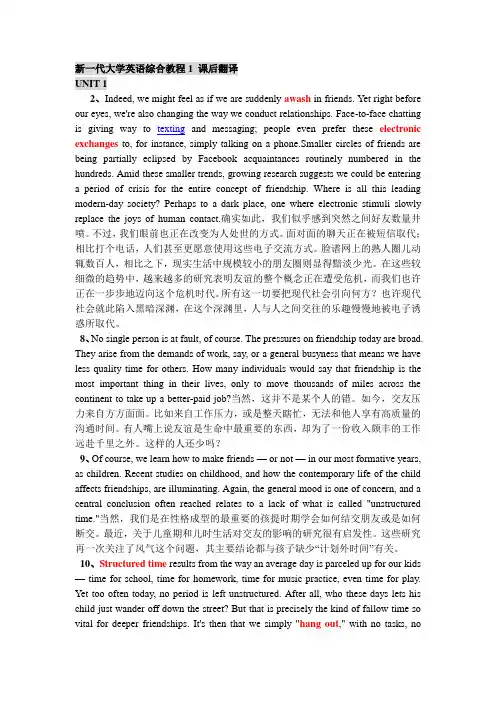
新一代大学英语综合教程1 课后翻译UNIT 12、Indeed, we might feel as if we are suddenly awash in friends. Yet right before our eyes, we're also changing the way we conduct relationships. Face-to-face chatting is giving way to texting and messaging; people even prefer these electronic exchanges to, for instance, simply talking on a phone.Smaller circles of friends are being partially eclipsed by Facebook acquaintances routinely numbered in the hundreds. Amid these smaller trends, growing research suggests we could be entering a period of crisis for the entire concept of friendship. Where is all this leading modern-day society? Perhaps to a dark place, one where electronic stimuli slowly replace the joys of human contact.确实如此,我们似乎感到突然之间好友数量井喷。
不过,我们眼前也正在改变为人处世的方式。
面对面的聊天正在被短信取代;相比打个电话,人们甚至更愿意使用这些电子交流方式。
脸谱网上的熟人圈儿动辄数百人,相比之下,现实生活中规模较小的朋友圈则显得黯淡少光。
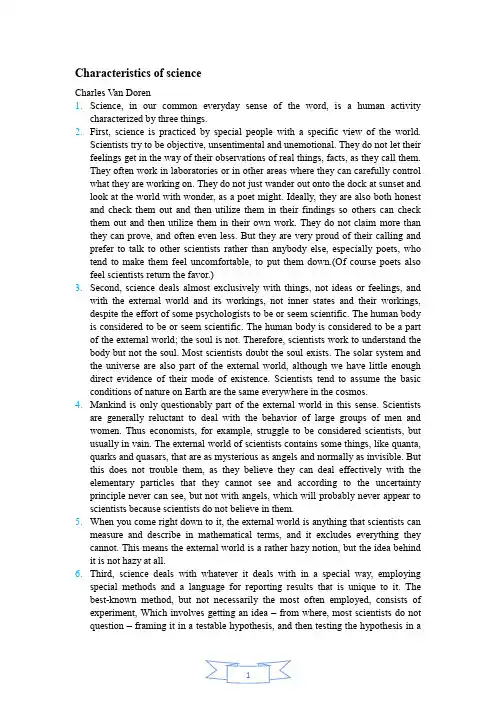
Characteristics of scienceCharles Van Doren1.Science, in our common everyday sense of the word, is a human activitycharacterized by three things.2.First, science is practiced by special people with a specific view of the world.Scientists try to be objective, unsentimental and unemotional. They do not let their feelings get in the way of their observations of real things, facts, as they call them.They often work in laboratories or in other areas where they can carefully control what they are working on. They do not just wander out onto the dock at sunset and look at the world with wonder, as a poet might. Ideally, they are also both honest and check them out and then utilize them in their findings so others can check them out and then utilize them in their own work. They do not claim more than they can prove, and often even less. But they are very proud of their calling and prefer to talk to other scientists rather than anybody else, especially poets, who tend to make them feel uncomfortable, to put them down.(Of course poets also feel scientists return the favor.)3.Second, science deals almost exclusively with things, not ideas or feelings, andwith the external world and its workings, not inner states and their workings, despite the effort of some psychologists to be or seem scientific. The human body is considered to be or seem scientific. The human body is considered to be a part of the external world; the soul is not. Therefore, scientists work to understand the body but not the soul. Most scientists doubt the soul exists. The solar system and the universe are also part of the external world, although we have little enough direct evidence of their mode of existence. Scientists tend to assume the basic conditions of nature on Earth are the same everywhere in the cosmos.4.Mankind is only questionably part of the external world in this sense. Scientistsare generally reluctant to deal with the behavior of large groups of men and women. Thus economists, for example, struggle to be considered scientists, but usually in vain. The external world of scientists contains some things, like quanta, quarks and quasars, that are as mysterious as angels and normally as invisible. But this does not trouble them, as they believe they can deal effectively with the elementary particles that they cannot see and according to the uncertainty principle never can see, but not with angels, which will probably never appear to scientists because scientists do not believe in them.5.When you come right down to it, the external world is anything that scientists canmeasure and describe in mathematical terms, and it excludes everything they cannot. This means the external world is a rather hazy notion, but the idea behind it is not hazy at all.6.Third, science deals with whatever it deals with in a special way, employingspecial methods and a language for reporting results that is unique to it. The best-known method, but not necessarily the most often employed, consists of experiment, Which involves getting an idea – from where, most scientists do not question – framing it in a testable hypothesis, and then testing the hypothesis in acontrolled environment to find out whether or not is id valid. The environment must be carefully controlled so that extraneous elements do not intrude to invalidate the experiments, and so that others can repeat the experiment in the hope of arriving at the same result, which is the best evidence of its reliability.7.But it is the language in which results are reported and in which the work itself isdone and with which it is controlled – namely, mathematics – that is perhaps the most distinctive characteristic of all. Most scientists would say that if you cannot describe what you are doing in mathematical terms, you are not doing science, and they prefer to report their results in mathematical terms because doing so is much easier and quicker (for them) and because scientists all around the world can understand them.8.It is also important that the work itself is done mathematically, which means thatthe observations being studied must be transformed into –or reduced to –numbers in the first instance, so they can be studied in a rational manner. The old idea of the earliest Greek scientists –that the world is essentially intelligible because it is some how conformed to the human mind – is thus converted into the Pythagorean view that the world, at least the external world that is the subject matter of science, is essentially mathematical and thus intelligible because the human mind is essentially mathematical, too.9.Wherever mankind has been able to measure things, which means to transform orreduce them to numbers, it has indeed made great progress both in understanding and in controlling them. Where human beings have failed to find a way to measure, they have been much less successful, which partly explains the relative failure of psychology, economics and literary criticism to acquire the status of science.10.Science was the major discovery, or invention, of the 17th century. Men of thattime learned – and it was a very great, revolutionary discovery – how to measure, explain and manipulate natural phenomena in the way that today we call scientific.Since the 17th century, science has progressed a great deal and has discovered many truths, and conferred many benefits, that the 17th century did not know. But it has not found a new way to discover natural truths. For this reason, the 17th century is possibly the most important century in human history. It instituted irrevocable change in the way human beings live on Earth. We can never go back to living the way we live in the Renaissance, for instance. We can only wonder whether the change was in all ways for the better.。

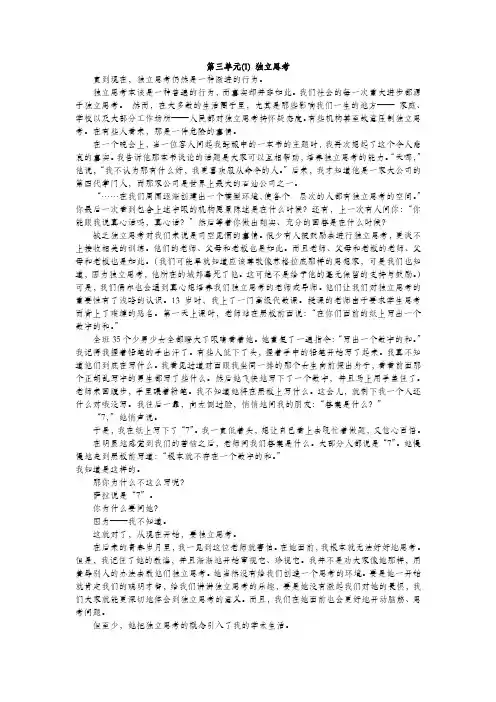
第三单元(1) 独立思考直到现在,独立思考仍然是一种激进的行为。
独立思考本该是一种普遍的行为,而事实却并非如此。
我们社会的每一次重大进步都源于独立思考。
然而,在大多数的生活圈子里,尤其是那些影响我们一生的地方——家庭、学校以及大部分工作场所——人民都对独立思考持怀疑态度。
有些机构甚至故意压制独立思考。
在有些人看来,那是一件危险的事情。
在一个晚会上,当一位客人问起我酝酿中的一本书的主题时,我再次想起了这个令人悲哀的事实。
我告诉他那本书谈论的话题是大家可以互相帮助,培养独立思考的能力。
“天哪,”他说,“我不认为那有什么好,我更喜欢服从命令的人。
”后来,我才知道他是一家大公司的第四代掌门人,而那家公司是世界上最大的石油公司之一。
“……在我们周围逐渐创建出一个模型环境,使各个层次的人都有独立思考的空间。
”你最后一次看到包含上述字眼的机构愿景陈述是在什么时候?还有,上一次有人问你:“你能跟我说真心话吗,真心话?”然后等着你做出翔实、充分的回答是在什么时候?缺乏独立思考对我们来说是司空见惯的事情。
很少有人被鼓励去进行独立思考,更谈不上接收相关的训练。
他们的老师、父母和老板也是如此。
而且老师、父母和老板的老师、父母和老板也是如此。
(我们可能早就知道应该尊敬像苏格拉底那样的思想家,可是我们也知道,因为独立思考,他所在的城邦毒死了他。
这可绝不是给予他的毫无保留的支持与鼓励。
)可是,我们偶尔也会遇到真心想培养我们独立思考的老师或导师。
他们让我们对独立思考的重要性有了浅略的认识。
13岁时,我上了一门高级代数课。
授课的老师由于要求学生思考而背上了难缠的恶名。
第一天上课时,老师站在黑板前面说:“在你们面前的纸上写出一个数字的和。
”全班35个少男少女全都瞪大了眼睛看着她。
她重复了一遍指令:“写出一个数字的和。
”我记得我握着铅笔的手出汗了。
有些人低下了头,握着手中的铅笔开始写了起来。
我真不知道他们到底在写什么。
我看见过道对面跟我坐同一排的那个女生向前探出身子,看看前面那个正胡乱写字的男生都写了些什么。
可编辑修改精选全文完整版新一代大学英语发展篇综合教程1答案Unit 1 Social media and friendship iExplore 11-2 iExplore 1: Learning before classReading comprehension lA B A B ADealing with vocabulary lA B A A A B1-3 iExplore 1: Reviewing after classApplication lReference:1. To say is easier than to do.2. Mary wantedto make a lot of money, buy stock, andretire early.3. She stayed up late either studving her English or goingto parties. iExplore 21-4 iExplore 2: Learning before classReading comprehension lB A DDealing with vocabulary l1.interactpatible3.massive4.contrast5.criticize/criticise6.hesitantiProduce1-6 Unit projectReference:Step 2: Make pre-debate preparationsA. Aristotle on friendship翻译:对于亚里士多德而言,友情可以分为三类:实用型友情,愉悦型友情和美德型友情。
实用型友情的基础是双方能够相互利用。
愉悦型友情视双方所能获得的快乐多少而定。
实用型友情和愉悦型友情都允许一一个人有多位朋友,而美德型友情与这两种关系不同,只能存在于一-对一-的关系里。
只有两个人德行一致(或非常相似),且都是品格高尚的人,才能发展这种美德型友情。
新一代大学英语教材1随着时代的发展,全球化趋势的影响以及对英语教育的需求日益增长,新一代大学英语教材正成为教育界的热门话题。
本文将就新一代大学英语教材1的特点、内容以及其对学生的影响进行探讨。
导论新一代大学英语教材1作为一套面向大学生的英语学习教材,旨在帮助学生全面提升综合能力,培养跨文化交流的能力,以适应全球化背景下的语言需求。
下面将逐一分析教材的特点、内容及对学生的影响。
特点1. 综合性:新一代大学英语教材1不仅注重听说读写的平衡发展,还结合了实际场景、真实素材以及文化背景,以提升学生的语言综合运用能力。
2. 拓展性:教材内容十分广泛,既包括实用英语技能,如日常生活对话、商务英语等,也涉及学术英语、科技英语等专业领域,帮助学生更好地适应学习和就业的需求。
3. 渐进性:教材难度逐级递增,从浅入深,适应学生的学习进程,帮助他们逐步提高英语水平。
4. 多媒体互动:教材采用多媒体教学手段,如配备音频、视频等,使学生可以更加直观地感受和练习英语,提高学习效果。
内容新一代大学英语教材1主要分为听力、口语、阅读和写作等模块。
每个模块都包含了不同主题的真实情景对话、文章和文本,并结合了相关语言点和学习策略。
以下是各个模块的简要介绍:听力模块:通过各种听力材料,如面试、讲座、广播等,提升学生的听力理解能力和语音语调的感知能力。
口语模块:注重培养学生的口语表达能力,包括日常对话、辩论、演讲等,通过角色扮演、小组合作等方式,激发学生的口语潜能。
阅读模块:涵盖了丰富多样的阅读材料,如新闻报道、学术文章等,旨在提高学生的阅读理解能力,培养他们的阅读习惯和文化素养。
写作模块:通过写作任务,引导学生在各个领域进行表达和思考,培养他们的写作技能和逻辑思维能力。
影响新一代大学英语教材1的引入对学生的学习和发展产生了积极的影响:1. 提升学习效果:教材注重培养学生的语言综合运用能力,使学生能够更好地应对实际语言交流场景,提高学习效果。
Unit 3 A journey of discoveryLearning objectives:✧talk about traveling using new vocabulary✧identify flashback and learn about its role in narratives✧translate with the skill of repetition✧explain the reasons why people travel✧understand the relationship between home and travel✧make a travel plan for an American touristProject forecast:By the end of this unit, you are going to make a personalized two-day travel plan in China for an American tourist. You need to carry out an interview with the tourist to find his/her preference and then make the plan based on the information you collected. To complete the task better, you need to carry out the following tasks:1.Understanding the texts.(1) Do you like traveling? What does travel mean to you?(2) Read the text in iExplore 1, and answer the following questions:➢What drove the author to write her second-grade writing — a travel tale?➢What motivates you to travel?(3) Read the text in iExplore 2, and answer the following questions:➢How did the author’s feeling about home change?➢What is the relationship between “home” and “travel”?2.Building your language.(1)Scan the QR code on page 58 to learn about the nouns that can also beused as verbs. Try to find the nouns with the same function in the two texts.(2)Scan the QR code on page 66 to learn about compound adjectives andhow they are formed. Try to find the compound adjectives in the texts and figure out their formation.(3)Complete the exercises on page 57-59 and 64-66.3. Sharpening your skills.(1) How does the author of the text in iExplore 1organize his idea? How doeshe narrate his story?(2) Scan the QR code on page 66 to learn about the translation skill —Repetition. Then do the translation exercises on page 66 and find out what part have you repeated in your translation.。
Characteristics of scienceCharles Van Doren1.Science, in our common everyday sense of the word, is a human activitycharacterized by three things.2.First, science is practiced by special people with a specific view of the world.Scientists try to be objective, unsentimental and unemotional. They do not let their feelings get in the way of their observations of real things, facts, as they call them.They often work in laboratories or in other areas where they can carefully control what they are working on. They do not just wander out onto the dock at sunset and look at the world with wonder, as a poet might. Ideally, they are also both honest and check them out and then utilize them in their findings so others can check them out and then utilize them in their own work. They do not claim more than they can prove, and often even less. But they are very proud of their calling and prefer to talk to other scientists rather than anybody else, especially poets, who tend to make them feel uncomfortable, to put them down.(Of course poets also feel scientists return the favor.)3.Second, science deals almost exclusively with things, not ideas or feelings, andwith the external world and its workings, not inner states and their workings, despite the effort of some psychologists to be or seem scientific. The human body is considered to be or seem scientific. The human body is considered to be a part of the external world; the soul is not. Therefore, scientists work to understand the body but not the soul. Most scientists doubt the soul exists. The solar system and the universe are also part of the external world, although we have little enough direct evidence of their mode of existence. Scientists tend to assume the basic conditions of nature on Earth are the same everywhere in the cosmos.4.Mankind is only questionably part of the external world in this sense. Scientistsare generally reluctant to deal with the behavior of large groups of men and women. Thus economists, for example, struggle to be considered scientists, but usually in vain. The external world of scientists contains some things, like quanta, quarks and quasars, that are as mysterious as angels and normally as invisible. But this does not trouble them, as they believe they can deal effectively with the elementary particles that they cannot see and according to the uncertainty principle never can see, but not with angels, which will probably never appear to scientists because scientists do not believe in them.5.When you come right down to it, the external world is anything that scientists canmeasure and describe in mathematical terms, and it excludes everything they cannot. This means the external world is a rather hazy notion, but the idea behind it is not hazy at all.6.Third, science deals with whatever it deals with in a special way, employingspecial methods and a language for reporting results that is unique to it. The best-known method, but not necessarily the most often employed, consists of experiment, Which involves getting an idea – from where, most scientists do not question – framing it in a testable hypothesis, and then testing the hypothesis in acontrolled environment to find out whether or not is id valid. The environment must be carefully controlled so that extraneous elements do not intrude to invalidate the experiments, and so that others can repeat the experiment in the hope of arriving at the same result, which is the best evidence of its reliability.7.But it is the language in which results are reported and in which the work itself isdone and with which it is controlled – namely, mathematics – that is perhaps the most distinctive characteristic of all. Most scientists would say that if you cannot describe what you are doing in mathematical terms, you are not doing science, and they prefer to report their results in mathematical terms because doing so is much easier and quicker (for them) and because scientists all around the world can understand them.8.It is also important that the work itself is done mathematically, which means thatthe observations being studied must be transformed into –or reduced to –numbers in the first instance, so they can be studied in a rational manner. The old idea of the earliest Greek scientists –that the world is essentially intelligible because it is some how conformed to the human mind – is thus converted into the Pythagorean view that the world, at least the external world that is the subject matter of science, is essentially mathematical and thus intelligible because the human mind is essentially mathematical, too.9.Wherever mankind has been able to measure things, which means to transform orreduce them to numbers, it has indeed made great progress both in understanding and in controlling them. Where human beings have failed to find a way to measure, they have been much less successful, which partly explains the relative failure of psychology, economics and literary criticism to acquire the status of science.10.Science was the major discovery, or invention, of the 17th century. Men of thattime learned – and it was a very great, revolutionary discovery – how to measure, explain and manipulate natural phenomena in the way that today we call scientific.Since the 17th century, science has progressed a great deal and has discovered many truths, and conferred many benefits, that the 17th century did not know. But it has not found a new way to discover natural truths. For this reason, the 17th century is possibly the most important century in human history. It instituted irrevocable change in the way human beings live on Earth. We can never go back to living the way we live in the Renaissance, for instance. We can only wonder whether the change was in all ways for the better.。